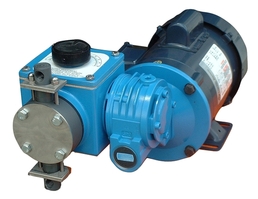When it comes to chemical dosing applications, whether it be metering sulfuric acid, caustic soda, alums, chlorides, or etc. etc., often times a diaphragm metering pump is the most appropriate pump type to get the job done.
The main reasons diaphragm chemical metering pumps are often preferred are: (1.) chemical compatibility with diaphragm materials and the chemical being pumped, as well as (2.) the consistent and accurate output one gets with a positive displacement pump utilizing a stroking motion.
With a diaphragm type metering pump, the stroke length allows for a repeatable output with each stroke. The operator can be confident his or her pump will be dosing the exact same amount of chemical with each stroke as it did the stroke before. This repeatability and accuracy helps cut down on wasted chemical and directly translates to saving money.
As for chemical compatibility, when dealing with chemical dosing, one often deals with corrosive and dangerous chemicals and as a result tough process materials are needed. Treating water for example usually calls for a corrosive chemical like sulfuric acid or sodium hydroxide, both of which can inflict significant damage if they come into contact with human skin. Making sure the pump’s wetted end can be designed with proper materials is crucial for successful operation of chemical dosing.
Choosing between solenoid and motor driven diaphragm type chemical metering pumps
Though there are various ways to drive a diaphragm type pump, solenoids and electric motors are by far the most common drivers. If you are not already familiar with solenoid metering pumps, the driving force of the diaphragm is a magnet, a solenoid, which reciprocates back and forth.
Take a look at the chart below to glance through the pro’s and con’s of both designs in comparison to each other.
| Solenoid Driven Diaphragm Metering Pumps | |
| Pro’s | Con’s |
| Lower initial cost Smaller & Lighter Digital inputs/outputs pre-installed Accurate at very low flow rates |
Short service life Limited flow capacity Limited pressure capacity |
| Motor Driven Diaphragm Metering Pumps | |
| Pro’s | Con’s |
| Durable, robust design Higher flow capacities Higher pressure capacities Designed to be repaired, not replaced |
Higher initial cost Heavier design Digital inputs and outputs need a separate component |
Often times the business decision of choosing a chemical metering pump for your chemical dosing application comes down to longevity and cost, with cost being on the front of your mind. Allow us to make a pitch as to why electric motor driven diaphragm metering pumps, like the Madden design, are the most cost effective choice between these designs and will ultimately save you money.
Cost effective chemical injection pump
|
|
| Madden JN series metering pump |
Madden Pump designs a chemical injection pump to operate 24/7/365 with little downtime. Our robust design is meant to last for years and years of consistent and accurate service life with any and all chemical addition applications.
Madden holds pump solution heads, diaphragms, and valve assembly parts in stock to be sent out at a moment’s notice and these parts come in a variety of materials allowing our design to handle virtually any chemical.
Purely from a cost standpoint, here is our argument for why the Madden Pump chemical injection pump design is the most cost effective design in comparison to the cheaper solenoid type metering pump.
Most solenoid driven diaphragm metering pumps serve applications with less than 100 PSI operating pressures and are designed with max capacities from 1 to 10 GPH. Madden Pump’s JN series pump directly competes with these, but our industrial and rugged design usually costs about twice as much as the solenoid driven metering pumps.
However, on average, after about 5 years, the Madden chemical metering pump will end up saving on costs in comparison, if your application is designed to dose chemicals 24/7.
Solenoid metering pumps tend to wear out after about a year or two when operating 24/7. The solenoid pump design is usually thrown out and replaced. Madden chemical metering pump is designed to only need occasional wetted end repairs. That means simply replacing a diaphragm, valve balls and seats.
After 5 years of replacing a solenoid metering pump, even if it was only 2 or 3 times, you will have spent the same amount of money, if not more, than you would have initially and up to the same point, on a Madden chemical dosing pump. Plus the chemical dosing operator will have needed to go through the hassle of procuring and replacing the solenoid pump several times.
Conclusion
If your chemical dosing application is going to be an integral part of your business for the next 5 plus years, strongly consider a Madden Pump diaphragm metering pump.
Our chemical injection pumps are designed to be a work horse for your chemical applications. Thick diaphragms, heavy duty actuating parts and housing, and a simple design allow our pumps to last for many years of service.
If you are interested in checking out a Madden metering pump, check out our sales rep page to contact a distributor near you, or send us your inquiry and we can get you squared away.

